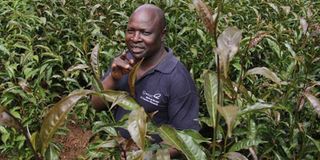Purple tea on former swamp and he’s a cut above the rest

Noah Kosgei at his farm. PHOTO | JARED NYATAYA
What you need to know:
- The tea seedlings require protection from direct sunlight
- Stories about the development of the wonder purple tea started reaching Kosgei in 2010
When Noah Kosgei bought 0.2 acres of marshy land at a price of a goat in 1999, little did he know that he would make a fortune out of it. By then, swamps were considered to be as sterile as deserts except during dry seasons when livestock would graze on them. People would give huge chunks of them to strangers for free.
Kosgei, now a successful farmer and the chief of Chemundu Location in Nandi County, told Seeds of Gold this week that he was inspired by a book he read about the green revolution in Israel.
It was about greening deserts by growing forests; soil-less farming and land reclamation.
“It was a compulsive reading. I began to religiously love swamps and deserts as unsung sources of wealth,” he recalls.
But it is the story about how two litres of water could be used to irrigate 50 orange trees for three months which titillated him to no end. This particular aspect puzzled him — especially against the backdrop of Israel leading the world in exporting fruits.
He was challenged. So he bought the swamp to start planting tea seedlings for sale. His success peaked last year when he sold over 300,000 purple tea seedlings worth Sh15 million.
The tough-looking administrator, who left Form Six in 1987, worked with the Tea Research Foundation of Kenya in Kericho between 1990 and 1996 where he did numerous certificate courses on tea nursery establishment and attended numerous trainings on setting objectives and targets.
He moved to Nyayo Tea Zones in 1996 rising to a zonal manager before resigning in 1999 to concentrate on farming. “I had bought the swamp and could not reclaim it while working with the tea zones so I resigned.”
He had by then established rapport with the Baraton University vice-chancellor. From the university, he got soil from a construction site and ferried it to reclaim the swamp, where he toiled for months.
He then bought tea scions from the Tea Research Foundation at 70cts each, gradually propagating up to 50,000 seedlings in one year. He sold each at Sh5 and pocketed Sh250,000. With these proceeds, he bought two more acres of “valueless” land.
The tea seedlings require protection from direct sunlight and to make shades, he used reeds from Kimondi River to the dismay of Ministry of Environment officials in Kapsabet.
He says nets for that purpose are prohibitively expensive. To survive, Mr Kosgei mobilised fellow farmers to register a community-based organisation which diversified into planting indigenous tree seedlings as well.
It worked. His greening efforts impressed the officials who permitted him to sparingly and selectively use the reeds. Mr Kosgei was also appointed a goodwill ambassador of youth and community empowerment capacity building by the local office of the Ministry of Gender, Sports, Culture and Social Services.
Another feather was added to his cap when he was appointed a chief in 2009.
“Visitors from far and wide made courtesy calls. In 2009 when the chief’s office fell vacant, I applied and easily qualified for appointment,” he says.
Stories about the development of the wonder purple tea started reaching Kosgei in 2010, when he was attending a seminar in Nyeri, organised by the tea foundation.
“It was all excitement for farmers. People talked about it: Herbal value, colour, resistance, yields – everything.”
Hardly had the farmer reached home after the seminar than he started making calls to the Tea Foundation’s Kericho office where he had been buying scions for ordinary tea.
The foundation agreed to perform a demonstration in Nandi: His farm was picked and within a month and farmers from as far as Kirinyaga and Kakamega trooped in in droves to witness his success.
“The visit triggered by the demonstration plot did it. In agribusiness, timing is a key thing. An opportunity comes once and I saw it before it was gone: market.”
He bought 100,000 purple tea cuttings and propagated them. In six months they were mature. Farmers bought them like hot cakes in one week, giving him Sh500,000.
Purple tea seedlings fetch 10 times more than the green ones, at Sh50 to Sh70 against Sh5 to Sh7 each.
He bought nets at Sh250,000 last year and planted a purple gold nursery of 1.5 acres.
This season, beginning June, he has over 300,000 seedlings ready for farmers worth Sh15 million.




